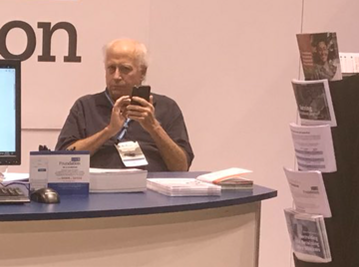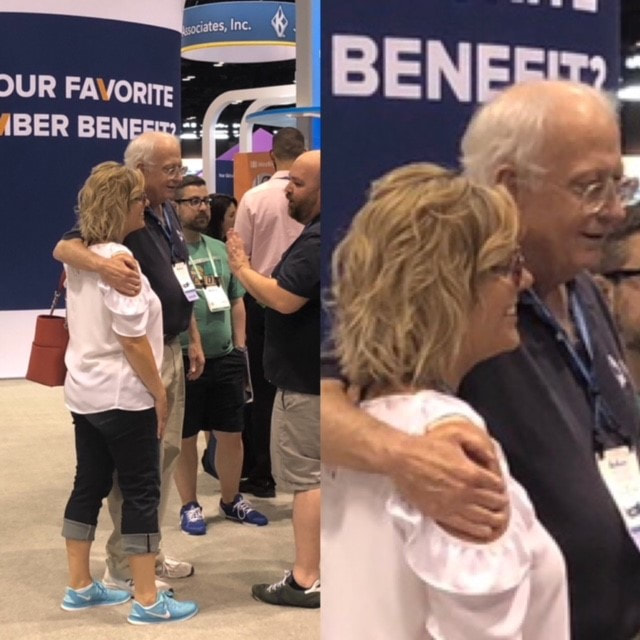|
Every once in a while, you meet someone with whom you instantly connect. Someone who just "gets" you from day one. Sure, you may meet a lot of people, but not everyone is a kindred spirit, someone you feel you have known on a transcendent level for far longer. I met John Jorgensen at SHRM17 (New Orleans), in the SHRM Bookstore (of course), and I knew instantly that we would be buddies. Maybe it was the grumpy exterior but twinkly eyes. Maybe it was the bear hug he gave me 10 minutes after we met. Maybe it was the deliberate way he stayed in contact with me throughout the conference that year. Whatever it was, from that day until now, hardly a day goes by when we don't have contact - even if it's just a wave on Facebook Messenger. Literally. Every. Day. Today is John Jorgensen Day. And for right reasons. John has been instrumental in the HR community for... I don't know... since TRex and the Personnel Office. He's been around the block a time or two thousand. He's an avid SHRM volunteer, and was even referred to as the "Godfather of the modern HR movement." (I love Laurie's post because it demonstrates the impact knowing John can have on your professional career. I also love Mary Faulkner's post because it highlights some of the more personal aspects of John.) Growing up, my grandfather (Pappy) referred to himself and his group of theologian pals as The Curmudgeons. Pappy was full of joy and laughter, always looking for an opportunity to play a joke on someone, and always a source of kindness and love for his community and those around him. Some of my earliest memories are of him whistling everywhere he went. When I was a wee lassie, I thought “curmudgeon” was a word he made up. I eventually learned the definition of curmudgeon in maybe Middle School (I’m guessing). It confused me. Pappy was far from grumpy and surly. To me, “curmudgeon” has always been a term of affection. As curmudgeony as he may appear on the surface, John is one of the most kind, tenderhearted and sincere people I’ve ever had the privilege to know. Today, I won’t go into detail about John’s wealth of HR (and life) experience and wisdom. I won’t pontificate about his incredible intellect, love for knowledge, history and music. What I want you to know about John is he is an exceptional friend, and a remarkable human. We can talk about football (although he’s a college fan, I’m an NFL fan), puppies, yard work, insomnia and beer. We can argue about whether beans in chili redefine it as soup. We have supported one another in sadness and loss of loved ones. We have celebrated successes and coffee. Every once in a while, something will get him going. And I love being on the receiving end of those rants. He is genuine and marvelous. John is the kind of guy I wish was my neighbor. Sincerely. I imagine scenes from Home Improvement in the back yard having conversations over the fence. He’s someone I have come to deeply appreciate and adore on so many levels. He has strong opinions, and is happy to share them with you. He’s a straight-shooter, and calls ‘em like he sees ‘em. Most importantly, John is a giver. A giver of his time, resources and insight.
Today, we celebrate John Jorgensen, for all he has done, and continues to do, for the HR profession and our community. And we celebrate John for being the kind of friend we admire, trust and respect. A lovely curmudgeon. Happy John Jorgensen Day!
1 Comment
Employees face some hard things in their personal lives. Somewhere along the line, we decided that people need to leave all of that at the door when they report to work. I have no idea where this became the expectation, but this is just silly. You cannot expect your employees who are dealing with incredible personal challenges to be able to switch all of that off when they walk in the door. To think that we can pretend that all of that isn't happening for 8-10 hours a day is ridiculous. Especially in this "bring your whole self to work" movement, we need to understand that the stuff going on in personal lives will, in fact, affect the work life to some extent or another.
Failing marriages. Miscarriages. Drug use. Elderly and ill parents. Car accidents. Deaths (family members, friends, pets). Financial hardships. Cancer. So many tough things that we all face in our lives. If you're practicing HR well, you should know by now that you need to be present with your employees. This requires abandoning your office frequently, and working where your people work. Belly up in an area where employees basically have to interact with you. And, ya know, talk to them. If you haven't been doing this, start now. It may seem weird at first, and certainly employees will wonder "WTH?" But over time (and it happens quickly), as you engage in chit-chat, employees will start to open up to you, about their business concerns, their opinions about the company, coworkers, managers and leaders. They will also open up to you about their personal challenges.
And here's the kicker. Don't just ask, "Is there anything I can do for you?" This is a very well-intentioned question. I would like to believe that when people ask this question, they really mean it. The problem is that when people are dealing with incredibly difficult, emotional issues, the last things they are thinking about are ways that others can help them get through it. In fact, most of the time, people don't even really know what they need. On top of that, if they are even remotely Type A, they would never dream of asking for help because this shows some sort of weakness and they are accustomed to pulling up their big-person pants and just getting through it. (Although, in secret, they are struggling, stressed out, losing sleep, crying in the bathroom, etc..)
Want to know how you can help? Show up. Be there. Offer some flexibility in their work schedule. Help them get connected to the right professional (counselor, financial adviser, elder care resources, fill in the blank....). If the issue is related to a medical challenge, talk to them about FMLA and/or the other leave options they have available to them. Explain whatever other benefits they have available - short term disability, bereavement, etc. Allow them to emote without fear of losing their jobs. Bring them a token of kindness that shows you empathize and you're there for them. If you have a close relationship with your team and employees, maybe even consider showing up at their house to help mow the lawn, clean the gutters, do laundry, drop off a few freezer meals. The ways you can show up are literally endless. And, shhhh, you can even offer them a hug. **GASP** I know... crazy talk that we in HR would ever think about physically touching an employee. (You really do need to know if this is ok. Because there are people who do not like to hug, and that needs to be respected.) There are ways to do this that don't make people feel uncomfortable or make you look like a creeper. But let me tell you, I've had grown men who seemingly have their shi.... stuff together in my office crying like a baby. And, yes, I offered a hug. Yes, they took me up on the offer. And, yes, I've had a shoulder full of tears. (And, no, there wasn't anything inappropriate about this.) Personally, I think this is a beautiful moment. It demonstrates the impact you have on others when you just listen, empathize, and give them a safe place to express the mess in their heads and hearts. It's amazing to me just how many people need a hug, as evidenced by how they lean in, and how tightly they hold on. I think we need to put our constant fear of being accused of sexual harassment aside to allow ourselves as humans to offer a very human expression of empathy - if you are comfortable with it and it is appropriate. (I feel like I should write a disclaimer, but you know what I mean.) The point is, be present and available. Be the HR Pro that your employees know they can trust and with whom they can share their personal struggles. Don't steer clear. Show up.
A Word About EAPs
These programs can be very valuable. HOWEVER, you need to know and understand your employee population. Not all EAPs are created equal. In fact, if you're in a first-responder environment (firefighters, police officers, paramedics, EMTs, ambulance responders, rescue workers, emergency room and/or trauma-related medical teams, etc.), likely you need to really evaluate the EAP offerings. I could write several posts on this topic alone. This is a population that deals with things that most of us will never see in our lives - and they see it on the daily. Refraining from going into graphic detail, these employees have different needs, and require a completely different level of emotional/mental support. Not only is this population even less likely to ask for help, they are exposed to horrific, awful, terrible, violent, unfathomable situations. This is an environment where you may want to consider a formal peer support program where employees are trained to identify certain behaviors, and become a safe place for peers to turn as a bridge to mental or behavioral professionals. If you are an HR professional in one of these environments, and you're interested in learning more, please contact me. I can provide you with several resources to help you develop and implement a peer support program that very well could mean the difference between life and death for your employees. |
Let's connect!Archives
September 2023
Categories
All
Archives
September 2023
|




 RSS Feed
RSS Feed